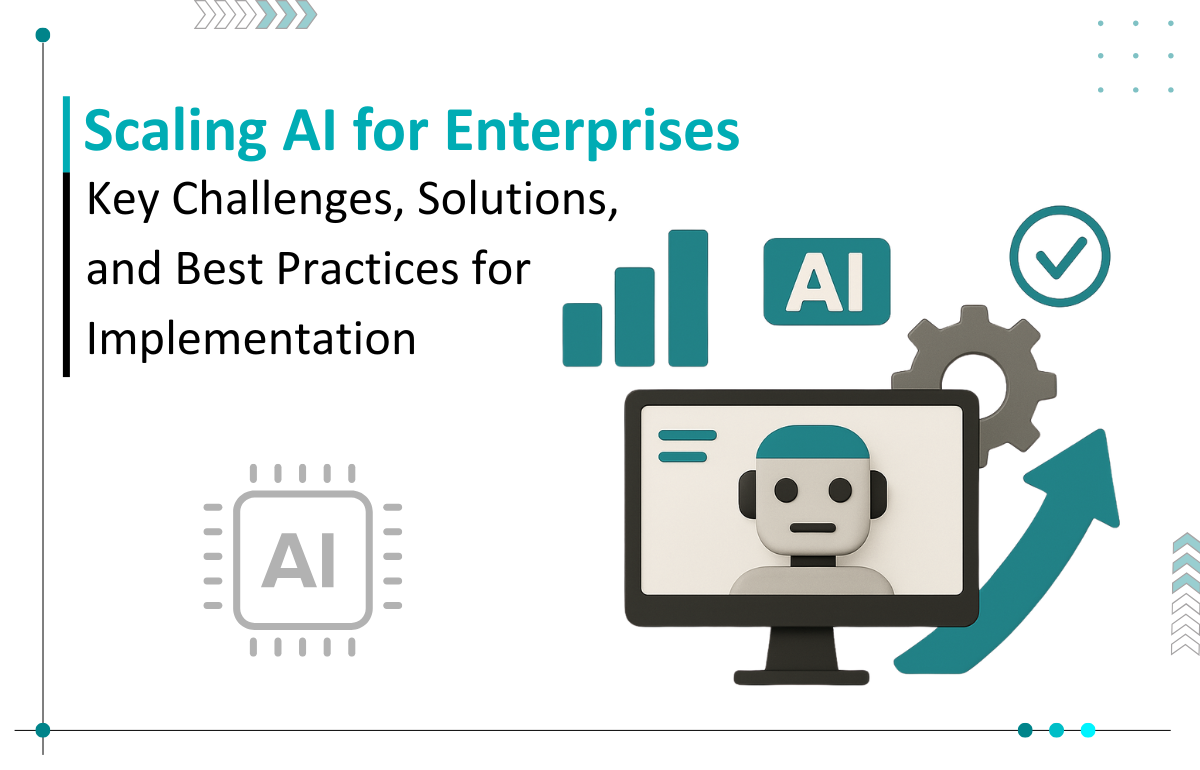
AI is changing the way business operates in interesting ways, with prospects for automation, enhanced personalized experiences, and decision-making based on data. The initial starting point of an AI application is relatively easy, but getting there across an entire organization introduces added complications.
Companies often start to feel under a web of technical, organizational, and ethical challenges that limit or restrict AI adoption. Scaling AI for enterprise requires a strategic approach that addresses both technology and operations. Enterprise AI scalability is not only about building accurate models but also about making them robust, reproducible, and maintainable across varied business functions to support scalable AI initiatives. A well-structured approach helps in delivering reliable AI solutions for enterprise environments that meet long-term goals.
Let’s discuss the top five Enterprise AI challenges enterprises encounter when trying to scale enterprise AI solutions and some methods that can help mitigate and navigate through these challenges.
AI relies on data, but organizations more commonly face issues with poor quality and fragmented datasets. If any data source is stuck in a particular department or tool, adopting it becomes problematic. Similarly, if you pull data from many systems and departments, figuring out which version is correct is a difficult task. These problems have a direct impact on machine learning data quality, affecting the accuracy and generalizability of AI models.
Organizations need to build centralized data lakes or data fabrics, establish strong data governance methodologies, and purchase data preparation and data cleansing applications to lay the groundwork for a scalable AI. Specifically, implementing data governance for AI ensures that data used in AI applications is accurate, secure, and compliant with regulatory standards. This foundation is critical for enterprise AI scalability and helps improve machine learning data quality from the ground up. These steps form the backbone of effective AI solutions for enterprise implementation. Additionally, applying techniques such as machine learning feature scaling ensures the input data is normalized, which improves model convergence and performance at scale.
AI models being tested and evaluated in controlled environments will not perform when scaled. Real-world data have variability and potentially inharmonious slowdowns in any learning. Two major issues:
Adopt continuous model monitoring and retraining practices. Implement MLOps platforms and pipelines to automate model updates, version control, and performance tracking, ensuring consistent and reliable outputs across deployments when scaling AI for enterprise use cases. These practices support the reliability and maintainability of enterprise AI solutions and should be core components of any enterprise AI strategy. Standard practices like machine learning feature scaling also contribute to improving model robustness across different environments and mitigating AI model drift.
Large-scale AI workloads require a lot of processing power, particularly for deep learning models. Many businesses are ill-prepared for the implications of infrastructure and cost.
AWS SageMaker, GCP Vertex AI, or Azure ML can be used to set up a hybrid or cloud-native infrastructure. These cloud AI services offer scalable platforms that can be auto-scaled and cost-optimized, and they can deploy uniformly using Kubernetes, Docker, and serverless functions. These tools support scaling AI for enterprise workloads efficiently and securely, ensuring the infrastructure is ready for enterprise AI scalability and supports dependable AI solutions for enterprise requirements.
To be more effective in establishing scalable AI systems, it will require an extent of cross-functional collaboration involving data scientists, data engineers, software engineers, DevOps teams, and business stakeholders. The quandary of sourcing talent is great, and then once an organization can source talent, the organization is faced with the difficulty of retaining that talent. These are not just hiring issues—they are fundamental AI implementation challenges that organizations must be prepared to address strategically.
Invest in upskilling programs. Employ seasoned experts who are knowledgeable about AI. Establish a culture that encourages experimentation and makes decisions about the development of new products based on data. Improve cooperation by using cross-functional teams and agile procedures. These organizational shifts directly address some of the most persistent Enterprise AI challenges and support the development of truly scalable AI capabilities. All of these efforts should be outlined and aligned with your broader enterprise AI strategy.
In tandem with developments in AI, there are increasing considerations for the risks associated with AI. Companies have to be attentive to fairness and transparency and be compliant with data protection while innovating and deploying AI systems.
Make sure to have responsible AI protocols, do audits for fairness, ensure transparency of models, and provide for secure data frameworks. Staying present in the fast-evolving landscape of regulations in your area is important, and collaborating with your legal and compliance teams should happen throughout. Ethical and regulatory compliance is one of the more sensitive Enterprise AI challenges that must be actively managed.
Scaling AI for enterprise is not just about building better models but rather the notion of building better systems, processes, and cultures. With a good awareness of these five Enterprise AI challenges and taking proactive, intentional action with a view to overcoming the challenges, enterprises can achieve a quicker path towards scaling AI and generating sustainable business value.
Enterprises that scale AI effectively do not work solely on technology. They think enterprise-wide—investing in data infrastructure, people, governance frameworks, and ethical frameworks; building AI capability, not just AI applications. These long-term investments are the foundation of true enterprise AI scalability. Leveraging best practices like machine learning feature scaling along with robust operational frameworks, further boosts the quality and reliability of enterprise AI solutions.
Are you having difficulty scaling your enterprise AI solutions?
Connect with Seaflux Technologies to design scalable, high-performing, and secure enterprise AI solutions that are fit for your business needs.

Director of Engineering